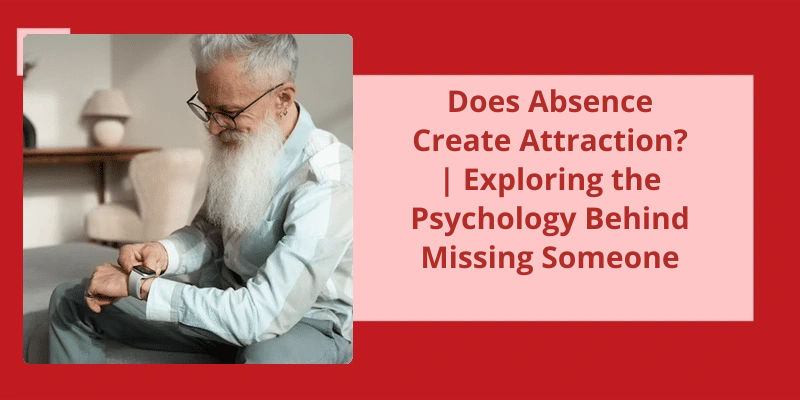However, it's not just long-distance relationships that may make the absence create attraction. It's not uncommon for people to start missing someone after they've spent a significant amount of time apart. Some even discover that the absence makes them appreciate their partner more, that they become more patient, understanding and even forgiving. On the other hand, others may find that too much absence makes it harder to connect with their partner, leading to a breakdown in communication and potentially damaging the relationship. With all the different factors involved, it's intriguing to question whether absence truly does create attraction?
Does Absence Increase Desire?
Absence does tend to increase desire in many cases, as it allows the mind to wander and imagine all the things that might be possible when the person or thing is present again. When someone is absent, their value and importance are often magnified, creating a sense of longing that fuels desire. This can be especially true in romantic relationships, where the lack of physical intimacy and companionship can often lead to a deeper emotional connection.
A short absence, such as a weekend trip, may lead to a temporary increase in desire, but it may dissipate quickly once the person or thing returns. On the other hand, a longer absence, such as a study abroad program or a prolonged business trip, may lead to a more sustained increase in desire.
While it can be a powerful tool in creating and maintaining strong emotional connections, it’s important to use it wisely and not rely on it too heavily.
How Can Absence Affect Different Types of Relationships, Such as Friendships or Family Relationships?
The lack of presence or absence can have varying impacts on different types of relationships, such as friendships or family relationships.
The notion of absence making the heart grow fonder has been a long-standing cliché. While it may hold some truth, it’s important to note that too much absence can also lead to the heart wandering. When we’re separated from our loved ones for extended periods, it’s only natural for our minds to wander, and our thoughts may stray to the possibility of finding new connections. In this article, we explore the effects of prolonged absence on relationships and how to prevent the heart from wandering.
Does Too Much Absence Make the Heart Wander?
With the abundance of technology and long-distance travel options in the modern world, it’s easier than ever to stay connected to loved ones from afar. However, the question remains: does too much absence make the heart wander? In short, the answer is yes. While a little distance can increase ones appreciation for their partner, an extended absence can create an emotional distance between partners, leading one or both parties to seek affection elsewhere.
When couples spend time apart, they can come to appreciate each other more deeply and look forward to being reunited. This distance can create a heightened sense of longing and desire for ones partner. However, if the distance is prolonged, this initial appreciation can morph into resentment, loneliness, and eventually, the desire for someone elses company.
Absence can also provide opportunities for infidelity to occur. When one partner is away for an extended period, they may become vulnerable to outside temptations. The lack of physical intimacy can lead to feelings of loneliness or unwantedness, while the novelty of a new relationship can be tempting. Additionally, relationships built over long distances or through online communication can be deceiving, leaving both parties feeling unsatisfied with the reality of a physical relationship.
Without consistent communication and quality time together, couples may begin to feel disconnected from each other. This emotional distancing can lead to the lack of emotional support and increase the likelihood of seeking it out elsewhere.
It’s essential for couples to maintain open communication, prioritize quality time together, and recognize the risks associated with being apart for extended periods. By staying connected and committed, couples can avoid the temptation of wandering hearts and build a strong, lasting relationship.
The Effects of Absence on Long-Distance Friendships and Family Relationships
This topic explores how physical distance and absence can impact the dynamics and strength of friendships and family relationships.
Source: Do you think that “Absence makes the heart grow fonder” …
Exploring the spiritual meaning of absence can uncover profound insights into the nature of change, loss, and growth. While absence can often feel empty and disorienting, it can also be a powerful catalyst for personal transformation and deeper understanding. By taking the time to reflect on the many nuances of absence, we can learn to embrace it’s challenges and opportunities, and find new paths towards healing and renewal.
What Is the Spiritual Meaning of Absence?
In spiritual terms, absence can be viewed as a way to connect with the divine and explore ones inner self. It can be a chance to focus on personal growth and self-discovery. By stepping back from the constant chaos of daily life, one can tap into a sense of calm and inner peace. This process can lead to a deeper understanding of ones place in the universe and a greater appreciation for the interconnectedness of all things.
At times, absence can also be seen as a form of surrender. When we let go of our attachments and expectations, we open ourselves up to the possibilities of the universe. We acknowledge that we aren’t always in control and that there’s a greater plan in place. This surrender can be a powerful and transformative experience, leading to growth and evolution on a spiritual level.
Of course, not all absences are the same. Some can be painful and difficult, especially when they involve the loss of a loved one or a significant relationship. By focusing on the bigger picture and the souls journey, we can find solace in the belief that the person or relationship has fulfilled it’s purpose and that their absence is part of a greater plan.
The Role of Absence in Spiritual Practices Such as Meditation and Solitude
Absence is a significant element in spiritual practices like meditation and solitude. It refers to being disconnected from external distractions to reach a state of mindfulness, self-awareness, and inner peace. Absence doesn’t mean physical or emotional isolation, but rather a temporary disconnection from everything, including our desires and attachments. By practicing absence, one can awaken the senses and achieve a deeper level of understanding of oneself and one’s surroundings, leading to spiritual growth and enlightenment.
It’s important to understand the impact of absence on a relationship and how to navigate those challenges. In the next section, we’ll dive deeper into how absence can affect relationships and what you can do to maintain a healthy connection, even when you’re apart.
Does Absence Make Someone Miss You?
It’s essential to understand that missing someone is natural. When youre used to having someone in your life, you cant help but think about them when theyre not around. When you miss someone, it’s easy to idealize their presence in your life, and this can often lead to a significant longing for them. However, absence should never be the only glue holding a relationship together. Just like any other relationship, it requires effort and communication to thrive, and this can’t be fully accomplished in isolation.
On the other hand, distance can also bring out some negative effects on a relationship. Being away from your loved ones can lead to feelings of loneliness, jealousy, and even a sense of betrayal (even if it’s not warranted). In some cases, it can also lead to the erosion of trust since youre not always sure what your partner is doing hundreds of miles away. This is why it’s critical to establish clear and honest communication guidelines before separation.
Overall, it’s essential to recognize that absence can be a double-edged sword in a relationship. While it can make you miss someone, it can also lead to negative feelings that can eventually harm your bond. Therefore, it’s up to both parties to put in the extra effort to make the relationship work despite the distance. This includes being open to communication, planning regular visits or trips, and building mutual trust and respect.
Coping Strategies for Missing Someone
Coping strategies for missing someone are ways to manage and deal with the emotions and feelings that come up when we’re separated from someone we care about. These strategies can include staying connected through technology, finding ways to distract yourself, taking care of yourself physically and emotionally, and seeking support from others. It’s important to remember that missing someone is a natural human experience and that there are healthy ways to handle it.
Understanding the concept of absence in psychology is crucial when analyzing certain behavioral patterns. Whether it’s the absence of skills, traits, or symptoms, it can provide valuable insight into a person’s psychological state. A common manifestation of absence is when someone suddenly stops communicating, such as in the case of speech loss. In this article, we will take a closer look at the meaning of absence in psychology and how it affects individuals.
What Does Absence Mean in Psychology?
In the field of psychology, absence has been studied in various contexts. One such area of study is in the realm of attachment theory, where absence can refer to the absence of a primary caregiver from an infant or childs life. Research has shown that prolonged separations can have negative effects on a childs development, leading to attachment and behavioral issues later in life.
Research has shown that memories can become distorted or altered in the absence of certain cues or information. For instance, if someone tries to recall a memory from a certain time period, but doesn’t have any contextual information to go with it, the memory may become less accurate or complete.
Additionally, absence can refer to the lack of certain traits or skills in an individual. This can manifest in various ways, such as a lack of empathy or social skills. In some cases, absence can also refer to the lack of certain mental health symptoms. For example, someone may be diagnosed with anxiety disorder, but when they present with absence of certain symptoms, such as avoidance or panic attacks, it can lead to a different diagnosis or treatment approach.
Another area of study in which absence is relevant is in the realm of addiction and substance abuse. The absence of certain neurotransmitters, such as dopamine, can lead to cravings and withdrawals, which can perpetuate substance use. Similarly, in recovery, the absence of these cravings and withdrawals can be a sign of progress and success.
It’s important for clinicians and researchers to understand and consider the role of absence in their work, in order to provide appropriate interventions and supports for individuals experiencing these phenomena.
The Role of Absence in Grief and Bereavement
Absence plays a significant role in grief and bereavement. It’s a feeling of loss that creates an emptiness within us. It represents the sense of losing someone we cared for and who was an important part of our life. It also reminds us of what we no longer have and can never get back, triggering feelings of sadness and pain. Absence can also bring back memories and emotions, making it difficult to move on. Thus, dealing with absence is an essential part of the grieving process.
Conclusion
However, it’s important to note that every relationship is unique and what works for some may not work for others. While absence can create attraction in some cases, it isn’t a guarantee and shouldn’t be relied upon as the sole factor in a relationship. Communication, trust, and mutual respect are essential components in any successful romantic partnership. Ultimately, whether absence creates attraction or not, it’s crucial to prioritize healthy and fulfilling relationships that bring joy and positive growth to all parties involved.






